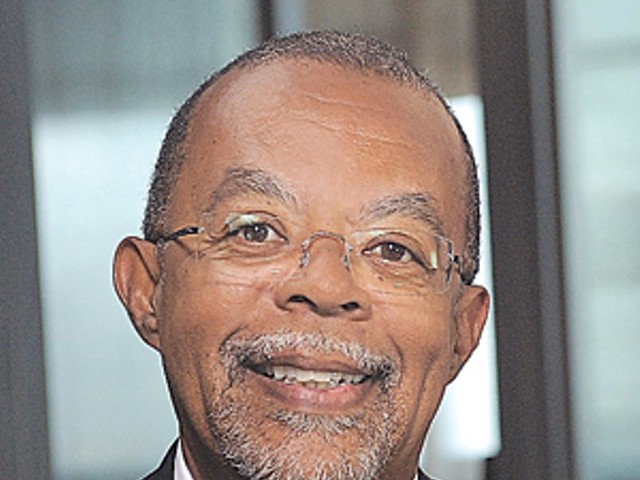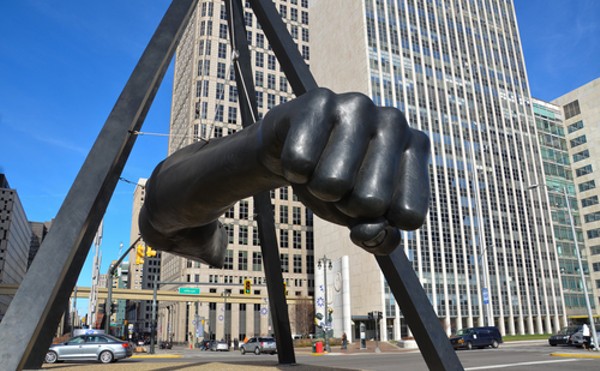The Detroit International Bridge Co. and its billionaire owner Manuel "Matty" Moroun took a major hit in court last week, when Wayne County Circuit Court Judge Prentiss Edwards ordered the removal of a duty free shop and fuel pumps constructed atop of 23rd Street in southwest Detroit.
The judge also ruled that the company, which owns the Ambassador Bridge, had to fulfill its contractual obligations regarding the Gateway Project, a public-private effort undertaken by the company and the Michigan Department of Transportation (MDOT).
As this rag has previously reported, the people of southwest Detroit gave their support to the project, which includes a massive truck plaza operated by Moroun, because it included elevated ramps that would keep bridge truck traffic off local surface streets.
But the bridge company, as history has shown, doesn't care all that much about contractual obligations. Or the law.
And before Matty's defenders accuse News Hits of unfairly editorializing here (What? Us? Editorialize?) we offer this observation from Edwards, who wrote in his ruling: "In light of DIBC's past actions in failing to abide by the provisions of the [Gateway] agreements, the Court has concerns regarding the level of compliance with the Court's Orders that may be expected from the DIBC. DIBC has not complied with the approved design and has constructed structures that are in opposition to the approved design."
Part of the issue in this case, which was brought by the state, is the allegation that the company illegally occupied a section of 23rd Street, owned by the city, and treated it as if it were its own. The company contends that, because it owns all the property on either side of the street, that it's also entitled to use of the road itself.
It's the mind-set of a company that's used to getting its own way.
But that seems to be changing.
Last year, after a protracted legal battle, the company was ordered to remove a fence and return to the city a portion of Riverside Park, another piece of city property the company treated as if it were its own. The property is crucial because the company needs to use it to build a second span across the Detroit River.
The company is appealing that ruling. And, although it's saying that it's still evaluating last week's ruling from Edwards, News Hits is willing to bet this month's mortgage money that this ruling will also be appealed. On the plus side, one positive result from all the company's court actions is that good ol' Matty is operating as a one-man stimulus package, making sure this region's lawyers never have to worry about a shortage of work.
Speaking of court actions, the DIBC just took another hit when Barbara McQuade, the newly appointed U.S. Attorney in Detroit, filed a brief debunking the company's claim that it is a "federal instrumentality" that doesn't have to abide by various state and local laws.
"DIBC is not a federal instrumentality, of any kind, or any other type of arm, appendage, servant, or agent whatsoever of the United States," McQuade wrote.
We would argue that Moroun might fairly be described as a certain kind of large, dangling appendage, but that's beside the point. What makes McQuade's filing interesting is that it contradicts a much-criticized ruling by the Michigan Supreme Court, which previously ruled that the Bridge Company didn't have to abide by Detroit zoning laws because it was, indeed, an instrument of the federal government when it came to moving traffic across the Ambassador.
The city's Law Department, we're told by someone in a position to know, would have liked to appeal that decision, but a certain person in the mayor's chair at the time — hint: his initials are KK — quickly put the kibosh on that talk. (It's worth noting that Matty generously gave that same KK's wife $50 thou to help her struggle through the hard, hard times of her hubby's three-month incarceration.)
In regard to the ruling by Edwards, bridge company President Dan Stamper, in a prepared statement, said: "Sometimes a loss can be a win. With this ruling in its favor, hopefully MDOT now will open the completed ramps providing direct freeway access to the Ambassador Bridge. The ramps have been finished since last May and MDOT has held them hostage because of this dispute, which involves a tiny portion of the $230 million Ambassador Bridge Gateway Project."
But MDOT spokesman William Shreck says those ramps can't be opened until the company fulfills its share of the project. Doing so is vital, he says, because the state received $170 million in federal money for Gateway, and if the ramps to keep truck traffic off of local streets aren't built, then that funding could be recalled.
Shreck also took issue with bridge company claims that the unilateral design changes it made regarding Gateway were only minor.
"It's like you hired someone to build you a house, and they instead built a 7-Eleven on property you didn't own," is his analogy.
Knowing the bridge company as we do, we imagine their response to that being something like, "What — you got something against 7-Eleven?"
News Hits is edited by Curt Guyette. Contact him at 313-202-8004 or [email protected]




